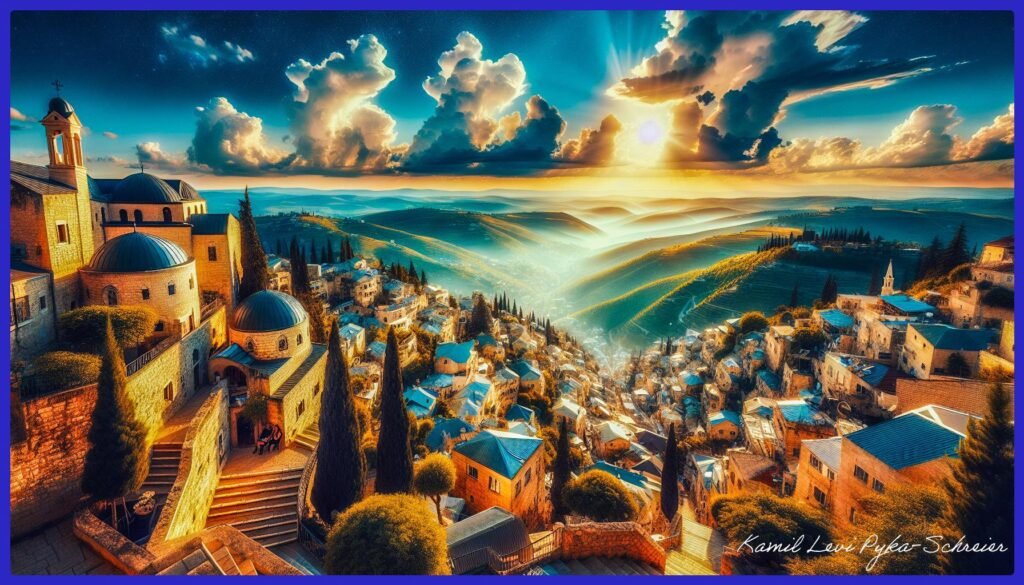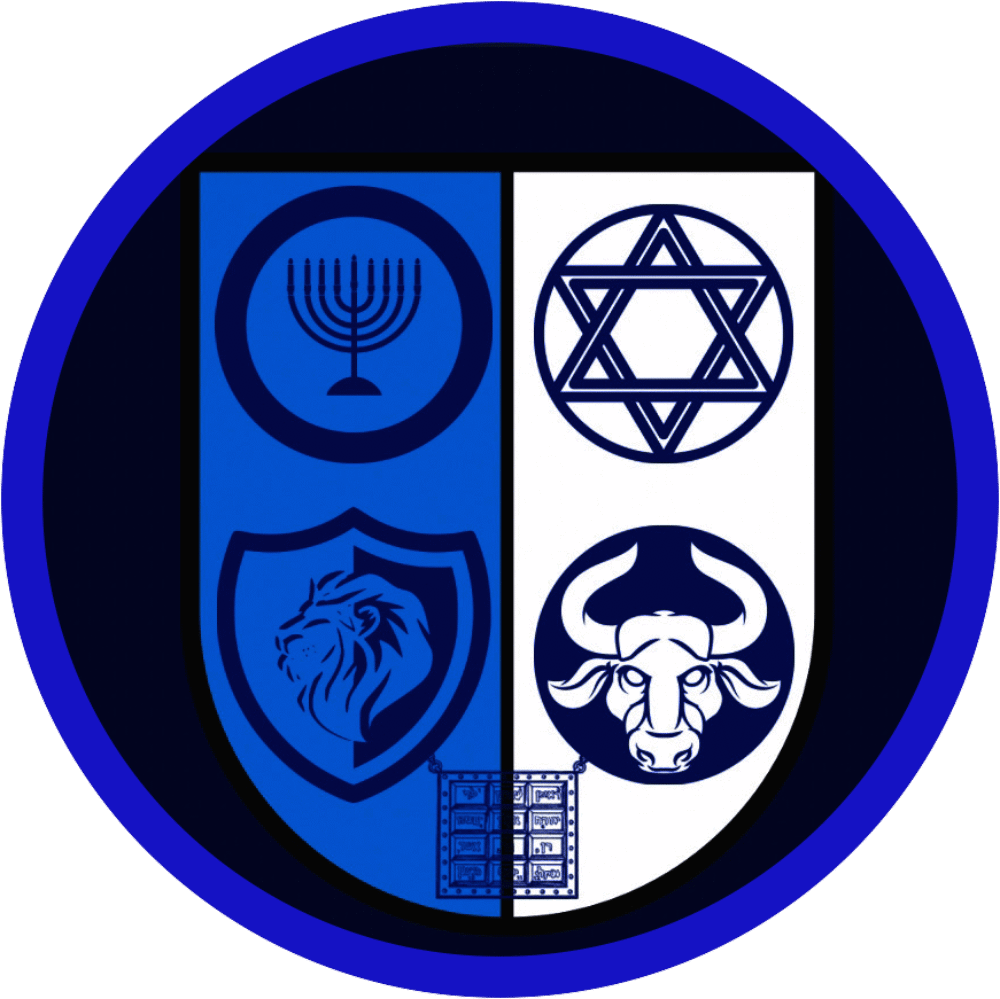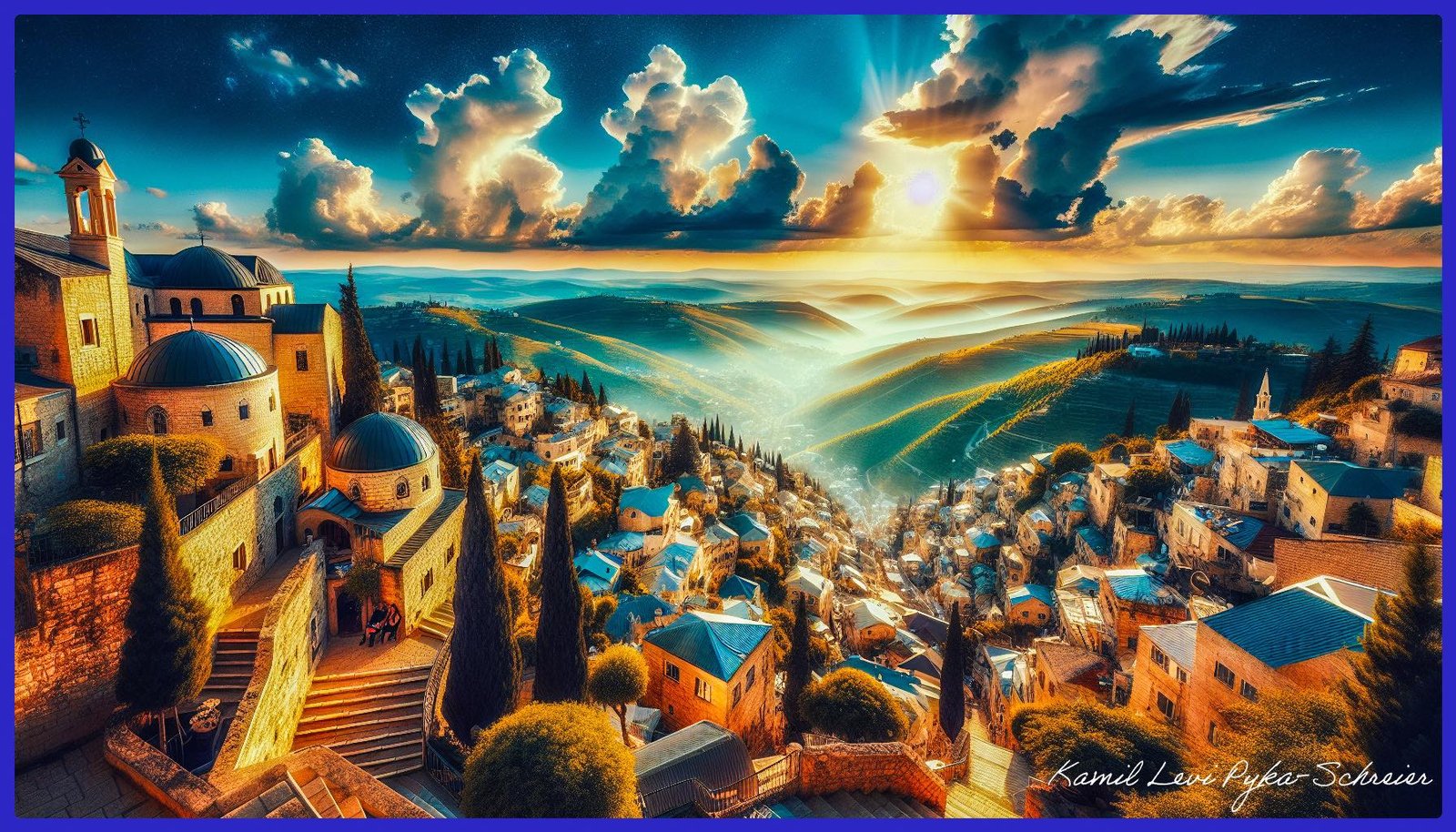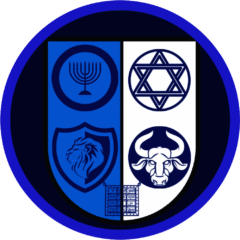
Parashat Vaera is the 14th weekly Torah portion in the annual Jewish cycle of Torah reading.
Aaron and Moses Before Pharaoh
Moses was not in the least a great tribune who won admiration by his great speech.
“I am of clumsy lips,” he said (the midrash directly states that he stuttered in his speech), and his ailment greatly made the mission he was entrusted with more difficult. So Aaron had to become Moses’ spokesman. Both brothers, however, were imbued with the same will, whose strength, indomitability and intransigence testified to
God’s presence; God strengthened his men.
We must not forget that the miracles that Moses and Aaron performed did not bring them good instant success.
Nevertheless, the brothers were undeterred.
They lived in constant danger, at the mercy of a cruel tyrant, and their own lives they only added a small price. Moses and Aaron devoted themselves completely to the noble mission for which God had chosen them.
They realized that the future of the nation depended entirely on their success. And it was this conviction that constantly gave them courage.
Four Degrees of Liberatoon
I am the Hashem. I will bring you out of the robots of Egypt and save you from their service and set you free you with an outstretched arm and with great judgments and I will accept you as my people and I will be your God” (6:6-7). I will bring you out: the yoke that burdens you will not be broken.
It will be weakened, but it will not stop humping you. You will get rid of him through no fault of your own. You will be passive, you will not directly participate in the gigantic work, you will not influence it in any way by his act. I will save you:
You have no chance to stand up yourself.
The hand of the oppressor presses you to the ground. I strike at her and her grip goes away. I will set you free:
I will become your deliverer, your only redeemer. Your terrible fate will arouse no participation in Egypt. No one has mercy on you, no one will secretly lighten your fate as condemned to death. The only one who will take you in and deliver you will be G-d. I will accept you:
You will not be spared for your virtues; your deliverance should be the beginning of the ministry that G-d expects from you.
“For your people” – you will not create a new confession, another religion. You will not come out of Egypt as followers of a new cult, but as the germ of a nation, which for the first time in human history revolves around God the King.
Genealogy of Moses
The plot unfolding in a strict time sequence is suddenly interrupted by the enumeration of Moses and Aaron’s ancestors.
There is a reason for this striking twist in the narrative. It is here, at the beginning of the magnificent epic, that we get to know almost “physically” those from whose blood both brothers come from. However much Moses and Aaron marked Jewish history, they were still human – and that’s all their size.
Moses and Aaron could ask for royal honors for themselves, they could say goodbye to poverty and discard modesty to satisfy such a human desire as ambition. Yet they did no such thing. At the moment when the eyes of the whole nation looked up to them in anxiety, when they stood at the pinnacle of power, us the text recalls the origin of Moses and Aaron, thus putting both men on an equal footing with all others descendants of Jacob.
Pharaoh’s Magicians
The fact that Pharaoh’s magicians were able to repeat the first miracles of Moses and Aaron is often the cause of dispute.
How to explain that the Egyptian magicians shared the abilities of G-d’e men? To understand this matter, it must be stated that according to the Torah, even a false prophet can prove himself by signs and miracles
- his actions represent a test of faith for Israel (Deuteronomy 13:2 and on).
The Egyptian magicians thus strengthened Pharaoh’s resistance by their actions and provided him with reasons to the rejection of Moses’ and Aaron’s demands. I will harden Pharaoh’s heart”.
When pondering the third verse of the seventh chapter, we often encounter the question of how God could severely punish a man who, according to the text, was not his master. Why punish the one whom God has freed from the consciousness of responsibility for the committed actions? Isn’t that the same as teasing an animal? On the other hand, we can ask why G-d strengthened Pharaoh’s stubbornness, and so actually he was prolonging the suffering of Israel. The mentioned difficulties can be explained in two ways. First of all, we can judge that G-d his by doing this, he intended to sharpen the consciousness of Israel, so that the Jews would mature in the midst of trials, and be so ready for their difficult future.
G-d therefore decided to perform many miracles – and Pharaoh was not allowed to back down at the first sign G-d’s will, as would be natural. The second explanation assumes that Pharaoh’s perversity it reached such a degree that God in an exceptional way deprived him of the possibility of repentance, of returning to himself, as every man deserves. Pharaoh was to suffer all the consequences for his actions, and therefore G-d blinded him to the extent that the wounds could reach their staggering proportions.
However, whether we lean towards one or the other explanation, one thing remains irrefutable: We have what to do with absolutely exceptional historical events, a time that is, according to the words of the wise
Yisrael comparable to the seven days of creation.
Blood, frogs, mosquitoes. The first plagues reveal to the Egyptians a fact they had neglected until then: G-d’s rule overby nature.
The Egyptians considered the forces of nature to be the incarnation of G-d.
For them, the Nile was not only the embodiment of fertility, but also possessed power in their imaginations
to decide periods of abundance or famine. That is why the first blows hit the Nile, which completely he controlled the spirit of the Egyptians.
What is more, nature, with its well-defined species and forms, was suddenly transformed. The otherwise timid frogs running away from humans have become aggressive. Mosquitoes, which usually did almost no harm, caused a real disaster. The pride of the Egyptians was humbled, and their haughty selfishness, which turned human beings into lawless slaves, was powerfully affected. Insects, plague, ulcers.
Three more plagues befell the wealth of Egypt – its sacred brav, its barns and stables, its horses. Pharaoh’s terrified nation witnessed enraged forces conspire against him. They caused great material damage to Egypt and left behind moral devastation. Hence the text it emphasizes how great a difference there was between the community of Israel and the Egyptians at that time. Not only that the possessions of the Jews bore no traces of the plagues which had just ravaged the whole country, but even the fortunes of Egypt, which were safe among the Jews, were forces of destruction, so to speak. - “magnified”. However, the disaster continued to escalate. The embarrassment of the Egyptians reached its peak when the the ridiculed magicians, incapable of any action, did not dare to appear before the pharaoh v Moses’ presence (9,1). They no longer trusted each other. Once they failed to protect their own people from terrible epidemics, they had to admit that their abilities had failed miserably. Construction, on which the Egyptians established collapsed. And in the midst of the chaos, the voice of Moses and Aaron was raised, to ask, “Let my people go, that they may serve me!” Hail. And the Hashem caused hail to fall on the land of Egypt (9:23)… And Moses said to him: When I go out of the city, I will stretch out my hands to the Hashem; the thunder stops and there will be no more hail, so that you may know that the Lord (belongs to) the earth” (9:29). In this place, for the first time, we encounter the power of God, which is not expressed only by the power of disaster, but also by its termination; G-d announced that He would stop the raging elements, and He did. The true reign of G-d is best manifested when the Creator, who sets his works into action and it gives rise to new things and works, it can stop the resulting movement: it defines boundaries and respects them.
- The hail thus completed the spectacular sequence of previous blows and brought Israel closer to God’s service, which was the only cause of his deliverance.
Chassidic Parashat
Golus HaDa’as
(the loss of awareness of Hashem’s presence)
“And I will take you to Myself as a People, and I will be your G-d. Then you will know that I am Hashem, the One who took you out from the subjugation of Egypt.” (Exodus 6:7) The verse states, “. . . then you will know that I am Hashem . . .”. It is as if to say, that up until now the Children of Israel did not know Hashem. They had become distanced from Him so much so, that they had to learn all over again. It is a condition which in part, brought on the Egyptian exile. The Baal ShemTov taught that not only were the physical bodies of the Israelites enslaved, but so too their minds. Pharaoh worked them so hard that they didn’t have any time to think about their situation; to contemplate if there was or was not a G-d who was concerned for them. That is the meaning of, “Increase the difficulty of the work for the men, and make sure they do it. . .”. (Exodus 5:9) Some of the people were even drawn into Egyptian idol worship. They had
forgotten the lessons of faith implanted in them by the Avos and they ceased to contemplate the meaning of a benevolent G-d who created and sustains the world; a G-d who maneuvers everything for the benefit of His people. They forgot that it is Hashem who establishes kings, and Hashem who deposes them at His will. This is Golus HaDa’as, the absence of the awareness of Hashem in the world. The eventual coming of the Messiah will be a time of divine knowledge for all, as the Rambam writes in the end of Hilchos Melachim (12:5). “And the time will come when there will be no more hunger or war, no more jealousy or competition.
Goodness will predominate the world and fine things will be as common as the dust. The whole world will be occupied with only one thing; to know Hashem. Therefore, Israel will be full of scholars brimming with wisdom, erudite in mystical matters, and each one achieving insight into the ways of Hashem, according to his ability, as it is written, “And the world will be full of the knowledge of Hashem as the seas are full of water.” (Isaiah 11:9)
That is why B’nai Yisrael, after the revelation of the Torah at Mt.Sinai, was called Dor De’ah, the Generation of Knowledge. The redemption from Egypt and the subsequent giving of the Torah served to complete the knowledge of Hashem which B’nai Yisrael had been lacking. The generation of the desert was able to achieve spiritual heights (despite some stumblings found in the book of Numbers), because they learned to apply what they knew in order to experience the presence of Hashem. Because of the severity of the servitude in Egypt it had formerly been impossible.
The Baal ShemTov represented a spark of the Messiah. Once the Baal ShemTov asked the Messiah, “Master, when will you arrive?” The Messiah answered him back. “You should know, that it will be when you will disseminate your teachings (his Chassidic doctrine) and reveal yourself to the world; spreading the wellsprings of your wisdom. That which I have taught you and you have achieved, others can also aspire to, effecting unifications and experiencing spiritual ascents. Then all the impure husks will fall away and there will arise a time favorable for salvation.”
The Messiah required the Baal ShemTov to disseminate his teachings and to apply them in the world. It was, and still is a prerequisite for the final redemption. When one doesn’t apply what he has learned and make it available in the world, that is Golus HaDa’as. Everybody asks, “Why did the Egyptians need so many plagues? Couldn’t
Hashem have begun with the Killing of the First-Born and finished off Egypt quickly?” The answer is, that the plagues were for the benefit of Israel. They needed to relearn the ways of Hashem in the world. Through the 10 plagues, they again understood that the world operates according to Hashem’s Divine Providence. The benefit of Klal Yisrael is foremost in His thoughts. So well did Klal Yisrael learn their lesson, that by the time they got to the Red Sea and passed through it on dry land, Chazal testify (Mechilta 15:3), that a simple maid servant reached a level of understanding of divine revelation that even the prophet Ezekiel didn’t reach!
Because of this, Chazal exhort us to mention the Exodus from Egypt twice every day in our prayers, “And you put signs and wonders in the land of Egypt until this very day”, declared the prophet Jeremiah (32:20). The meaning is, that reflection on the events of the exile and slavery and the subsequent redemption can be a catalyst for one to break out of his Golus HaDa’as, and to reach full cognizance of the presence of Hashem. “In every generation, one is obligated to consider himself as if he himself came up out of Egypt.” (Passover Haggadah) This is the breaking of Golus HaDa’as. This is also the underlying idea of Da’as Torah, the authority of the foremost Torah sages. There are a few in every generation, who because of their supreme mastery of the Torah, have the clarity to see things as they really are without any husks blurring their vision. One who follows their advice will not be led wrong. HaKores HaTov (gratitude)
“When Pharaoh saw some relief from the (plague) he hardened his heart and didn’t listen to them, just as Hashem had predicted.” (Exodus 8:11)
As was mentioned in Parshas Vayetzei, the root of the Jewish soul is the expression of thanks and gratitude. We are called Yehudim, after Yehudah, the son of Yaacov and Leah. The name Yehudah comes from the same root as “to thank”. This is the essence of a Jew, constantly thanking Hashem. A Jew understands that everything that Hashem gives is a gift. In reality, we don’t deserve anything, nevertheless Hashem gives. And we thank Hashem for it.
Not only the one who is sick and is healed or the one who is in distress and is rescued needs to praise and thank Hashem. Certainly he feels it more acutely. Nevertheless, everybody is obligated to thank Hashem since He sustains the world. Would that He would remove His attention from it for even a split second, all of creation would return to chaos. Psalm 107 speaks about the different types of people who need to express gratitude to Hashem and how he exhibits control over every aspect of the world. As it says (verse 43), “Whoever is wise and takes note of all this, will comprehend the kindness’ of Hashem.” Pharaoh, the moment he felt relief from the wrath of the plagues, reverted to his previous hard-hearted state. He refused to recognize the hand of Hashem and express the gratitude due to Him.
We see in the Parsha a number of examples of Hakores Hatov. When it came to initiating the plague of blood (which affected the water), and the plague of lice (which affected the soil), Aaron was called upon instead of Moshe Rabbenu to strike the water and the soil with Moshe’s staff. Rashi quotes the Midrash (Shemos Rabbah 9:10) which states that because Moshe Rabbenu was helped by the water (when he was an infant in the little ark), and the soil (where he buried the Egyptian taskmaster), it would not be a proper show of gratitude for him to
strike them. If Moshe Rabbenu was careful to exhibit such a level of gratitude towards the inanimate world, how much more so should one be careful to display gratitude towards one’s fellow human beings and towards the Creator. R’ Menachem Mendel, the Kotzker Rebbe, used to follow the Torah’s example. Whenever he needed to replace a worn pair of shoes, he would neatly wrap up the old ones in newspaper before placing them in the trash. “How can I”, he would
declare, “Simply toss away such a fine pair of shoes that have served me so well these past years!?”
HaKores HaTov goes still further. Again we learn from our foremother Leah after she gave birth to her fourth son. “And she said, this time I will give thanks (odeh) to Hashem. Therefore she called his name Yehudah, and she ceased to give birth further.” (Genesis 29:35)
Here, the Chozeh of Lublin asked one of his famous questions. If Leah expressed her gratitude to Hashem, why did she stop having babies? It should be just the oppo. One would expect Hashem to grant her more! His answer is a foundation of Yiddishkeit. Even though Leah expressed her thanks to Hashem, she gave thanks only for what she received in the past, but she neglected to beseech Hashem concerning the future. From here the Chozeh of Lublin taught, that a Jew needs to says, “Baruch Hashem that you have helped me until now. May You continue to help me in the future”. This is also expressed in the Nishmas prayer said on Shabbos and Yom Tov mornings. “Until now Your mercies have helped us, and Your kindnesses have not forsaken us; our G-d don’t ever abandon us!” (See another example in Mishna Brochos 9:7. When one comes to a city he should recite two blessings upon entering and two upon leaving, according to the opinion of Ben Azzai. When he arrives he should thank Hashem for having arrived safely. Upon leaving he should beseech Hashem to protect him on his future travels.)
The ultimate expression of this teaching is explained by the She’lah HaKodesh. One should always pepper his speech with phrases like: “Baruch Hashem” or “with the help of Hashem”, “G-d willing” etc. Training oneself to speak in such a manner will help a person to always maintain a sense of gratitude to the Creator for all that he has.
R’ Zusia And The Rav
In the town of Anipoli there were two Rabbis, R’ Zusia the Chassid and the town Rav, a Misnagged. R’ Zusia was always happy despite the fact that he had nothing but troubles; poverty and ill-health. The Rav on the other hand, despite his honorable position in the community was always unhappy, depressed, bitter and angry. He couldn’t bear others, nor even himself. One night, bitter and frustrated he went to ask R’ Zusia for help. He sneaked out of his house at an hour when nobody would see him and secretly made his way to the hovel which R’ Zusia called home. When he arrived the lamps were still burning, so he knocked hesitantly. Almost immediately R’ Zusia appeared at the door with a smile and an invitation to enter.
“How is it that you are so happy and content and I am always angry and cursing everybody”, asked the bewildered Rav?
“Let me give you an example”, offered R’ Zusia. “Take the wedding of R’ Moshe’s daughter. When Reb Moshe, the local philanthropist, made a wedding for his daughter recently, he dispatched a messenger to personally invite the special
citizens of Anipoli. When the messenger came to your house, you demanded to see the guest list. You saw that you were 14th on the list”.
“‘Chutzpah!’, you shrieked, and decided that you would attend, but come late. When you arrived, all the guests were sitting at the tables already and eating the festive meal. When you arrived, there were no empty places to be found.”
“Soon, Reb Moshe the philanthropist saw you looking for a place to sit. ‘Rabbi’, he called out, ‘where have you been?’ They brought you to the head table, but there were no more empty places. They brought you a chair, but you sat behind somebody else. You were furious, looking for somebody to lash out at, but nobody was really paying any attention to you. The waiter didn’t even see you. By the time the host noticed that you weren’t eating, all the food was gone.”
“R’ Moshe went into the kitchen to find something, but it was not a portion befitting the Rav of Anipoli. Everything had already been picked through. By this time you were cursing the host and the waiters and the guests and even the bride and groom themselves. When it came time for the bentching (Grace after Meals) and the Sheva Brochos (seven blessing said after the festive meals in the presence of the bride and groom), you had been all but forgotten. You went home broken, angry and bitter, cursing the Master of the World Himself.”
“When the messenger came to the house of R’ Zusia, (he always referred to himself in the 3rd person), Zusia was taken aback. What a kind gesture! Reb Moshe is inviting Zusia to the wedding of his daughter?! What has Zusia ever done to deserve an invitation to their wedding?! So Zusia went two hours early to the wedding. Zusia asked what he could do to help set up. Zusia officiated at the ceremony. Zusia ate a full meal. Zusia was honored with bentching and Zusia recited the Sheva Brochos.”
“You see”, R’ Zusia continued his explanation to the Rav of Anipoli, “You wanted everything, but you ended up with nothing. Zusia didn’t ask for anything, but he got it all!”


